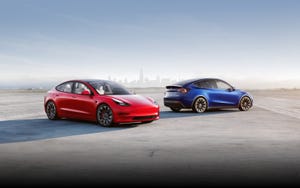
Tesla Reports Record Revenue for 2022, 1.31 Million EVs Sold - CNET
Tesla’s finished 2022 on a tear, bolstered by recent price reductions for its stable of electric sedans and SUVs. The automaker’s full-year 2022 earnings statement, released at the close of market Wednesday, revealed it delivered 405,278 electric cars in the fourth quarter — up from 343,830 deliveries in the previous quarter. This brings Tesla’s total deliveries in 2022 to 1.31 million cars, which is a record high for the brand and 40% growth year-over-year, but also just short of its own goal of 1.4 million deliveries.
In Tesla’s earnings release, it notes that the average sale price for its vehicles has “generally been on a downward trajectory for many years.” The automaker reduced prices by up to 20% on its lineup of electric cars late last year — a move spurred partially by reduced demand but also to get the Model 3 and Model Y under the $55,000 qualification cap for the $7,500 electric sedan federal tax credit included in last year’s Inflation Reduction Act.
Read more: What Biden’s Proposed EV Charging Standards Mean
Investors weren’t super happy with the price cuts, but Elon Musk posited that more affordable Teslas is a good thing.
“It’s always been our goal to make cars affordable to as many people as possible,” Tesla’s CEO said in a call Wednesday with investors. “So I’m glad that we’re able to do so.”
The automaker reports that the average sale price of a Tesla has halved between 2017 and 2022 and will likely continue to fall. That’s partially due to price drops, but mostly thanks to the less expensive Models 3 and Y now making up the lion’s share of Tesla’s production and deliveries. In 2018, they accounted for just over half of Tesla’s 254,530 sales; today they’re around 95% of the 1.31 million Tesla cars sold in 2022.

This week, Tesla announced a multibillion dollar investment to expand its Nevada Gigafactory.
Tesla
Despite the decreasing average transaction price, Tesla said it’s improved its operating margins from a negative 14% to a positive 17% over the period of 2017 to 2022, crediting the same shift to models that cost less to produce, as well as its investment in localized, more efficient factories. Earlier this week, Tesla announced a new $3.6 billion investment in its Nevada Gigafactory, adding two new factories to the facility: A 100GWh factory will support enough production of its 4680 battery cells for up to 1.5 million light duty electric vehicles annually. Meanwhile, a high-volume Semi factory will eventually produce Tesla’s full-electric commercial truck.
Tesla also projects that software-related profits, after-sales and services will take up some of the slack of lower transaction prices. “While we continue to execute on innovations to reduce the cost of manufacturing and operations,” the investor deck states, “over time, we expect our hardware-related profits to be accompanied with an acceleration of software-related profits.”
Last year, Tesla also released its Full Self-Driving Beta to around 400,000 customers in the US and Canada who paid for the driver-assistance software, and while that launch hasn’t been without controversy, it’s an important step in the automaker’s plan to accelerate its software-related earnings. FSD, as of a September 2022 price hike, is a $15,000 add-on on top of the cost of the vehicle. (We note, as always, there are no self-driving cars currently for sale.)
“I’ve always said that Tesla is as much a software company as a hardware company, but Tesla is really one of the world’s most leading AI companies, both on the software side and the hardware side,” Musk said on the investor call. “As we get closer and closer to solving real world AI — this is the thing that has order-of-magnitude potential for Tesla.”
Tesla sees the rollout of its $15,000 FSD upgrade as an accelerator for profit.
Tesla
Used car sales, revenue from paid supercharging and growth in its brick-and-mortar service and mobile service fleets also contribute to “much of the profit in 2022,” according to the report. Meanwhile, outside of vehicle-related growth, Tesla also saw increases in its energy storage (152%) and solar energy (18%) businesses. In total, Tesla posted a net profit of $3.7 billion, or $1.07 a share, compared with $2.32 billion, or 68 cents a share, in the fourth quarter. Revenue rose by 37.2% to $24.4 billion.
Looking forward, Tesla expects its growth streak to continue, predicting 1.8 million cars sold in 2023. A long time coming, Cybertruck production is expected to begin later this year in Texas, with more details due at the automaker’s Investor Day event on March 1. Meanwhile, the Tesla Semi has entered pilot production in Nevada, with the first few examples delivered to PepsiCo late last year.

